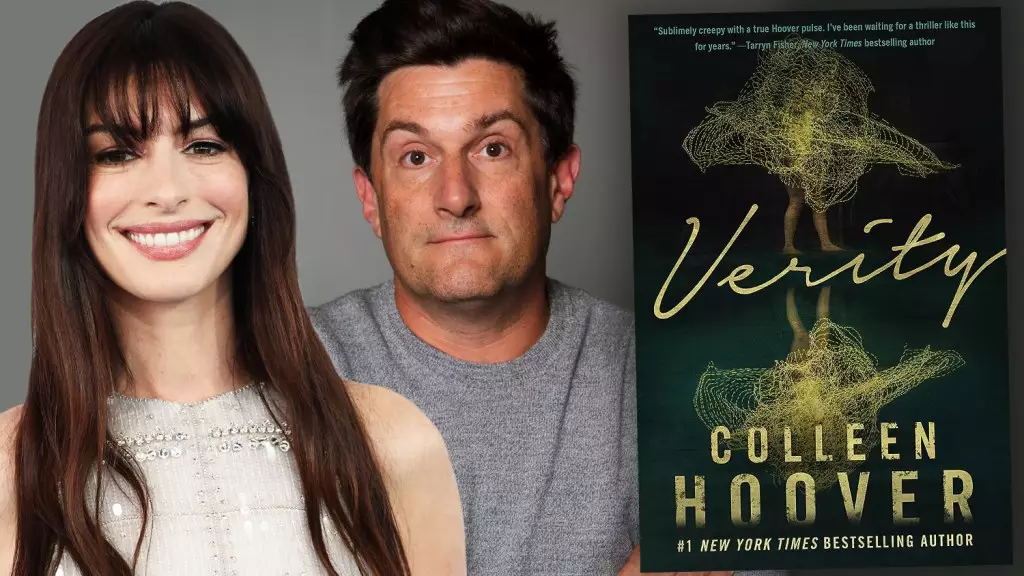Colleen Hoover has become a titan in the literary world, especially among young adults and romance enthusiasts. With her novels flying off the shelves, the surge of adaptations has propelled her stories into the spotlight, leaving fans both excited and anxious. The film adaptation of *Verity*, set to be released on May 15, 2026, follows closely on the heels of her previous work, *It Ends With Us*. Many in the film industry are eager to see how *Verity* will stack up against it. However, it’s essential to understand that adaptations can be a double-edged sword, igniting fervor among fans and filmmaker alike, but also potentially diluting the essence of the original story.
The Star-Studded Cast
The talent assembled for the film adaptation of *Verity* is undeniably impressive. With Anne Hathaway taking on the lead role of Verity Crawford and Dakota Johnson portraying Lowen Ashleigh, the performances promise to breathe life into intense characters. Josh Hartnett’s casting as Jeremy, Verity’s husband, adds another layer of intrigue to the film. Notably, this casting reflects a concerted effort by filmmakers to attract seasoned actors capable of delivering nuanced performances. Still, one must wonder: will star power overshadow the authenticity of the story or inject new life into the characters that Hoover has carefully crafted?
The Director’s Vision
Michael Showalter is set to direct *Verity*, a choice that brings with it a blend of excitement and skepticism. Having previously collaborated with Hathaway on *The Idea of You*, it feels promising. Yet, one cannot overlook potential pitfalls; Showalter has primarily worked in comedy and lighter fare, raising questions about whether he can adeptly handle the psychological intensity needed for this narrative. Does he possess the artistic instincts necessary to navigate the dark, murky waters that Hoover’s story presents? Here lies the delicate balance between a director’s past work and the foundational fear that an adaptation may misinterpret the soul of the original material.
Behind the Scenes: A Collaborative Effort
The team behind *Verity* doesn’t end with Showalter and the cast; the production also boasts an intriguing mix of writers, including Nick Antosca and others who’ve had their hands in drafting the screenplay. This might be a double-edged sword as well—more writers can mean a richer story, but how much creative compromise will occur? Different perspectives may enhance the screenplay, yet viewer attention needs to be steered clear of incoherent plot desires. Finding that precise balance could prove vital to ensuring the film resonates with audiences looking for the spine-tingling thrills contained in Hoover’s original work.
Beyond the Thrills: Emotional Depth
What makes *Verity* compelling is not just its surface-level thriller aspects; it’s the emotional underpinning that amplifies tension and keeps readers invested. Lowen Ashleigh’s struggle is not limited to penning a book but extends into psychological turmoil. One hopes this complexity translates well onto the screen. Will the film prioritize the twisted psychological elements in Hoover’s text, or will it settle for more conventional thrills? The worst-case scenario would be stripping away the emotional depth to create a formulaic suspense flick, which would not only betray Hoover’s work but also disappoint audiences whose expectations are rooted in the novel’s raw emotional authenticity.
A Future of Adaptations
With the success of *It Ends With Us*, it’s no wonder film adaptations of Hoover’s subsequent novels are rapidly being greenlit, including *Regretting You*, which is slated to hit theaters in October 2025. The frenzy surrounding these adaptations raises a broader question about the nature of storytelling in modern entertainment. Are we prioritizing marketability and star-studded casts over genuine storytelling? Will *Verity* add depth to the growing genre of adaptations, or will it fall victim to the pitfalls of rushing projects into production? The outcome of these films could shape how the industry treats popular literature going forward.


Leave a Reply